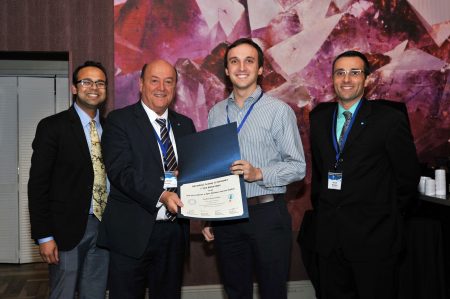 Judicial Evidential Reasoning for Decision Support Applied to Orbit Insertion Failure, a paper co-authored by AE doctoral candidate Andris Jaunzemis, has received the 'Best Student Paper' award at the 1st International Academy of Astronautics Conference on Space Situational Awareness (ICSSA).
Judicial Evidential Reasoning for Decision Support Applied to Orbit Insertion Failure, a paper co-authored by AE doctoral candidate Andris Jaunzemis, has received the 'Best Student Paper' award at the 1st International Academy of Astronautics Conference on Space Situational Awareness (ICSSA).
Announcement of the award came during the conference's 3-day proceedings, held Nov. 13-15 in Orlando, Florida.
Jaunzemis is the principle author on the paper. His co-authors are his advisor, AE professor professor Marcus Holzinger, AE professor Karen Feigh, AE post-doc Dev Minotra, Lockheed Martin Technical Fellow Moses Chan, and University of Kansas professor Prakash Shenoy.
Jaunzemis's work investigates how sensor networks could resolve specific space situational awareness (SSA) hypotheses in minimum time with as little confirmation bias as possible.
"Confirmation bias can be a big problem in space or any environment where you need to observe new phenomena," says Jaunzemis."Basically, it's the notion that, if you start observing things with the wrong conclusion in your head, you'll search for evidence that confirms it. We are seeking to overcome that barrier."
The novel proposed method is tested against a geo-transfer orbit anomaly resolution scenario.
In the paper, Jaunzemis presents judicial evidential reasoning (JER), a framework that interprets decision-maker questions as rigorously testable hypotheses. His approach values impartiality and time efficiency. An ideal action sequence gathers evidence to quickly resolve hypotheses while guarding against bias.
"JER applies the Dempster-Shafer theory of belief functions to model knowledge about hypotheses and quantify ambiguity. Adversarial optimization techniques are used to make many-hypothesis resolution computationally tractable," he said.
A native of Maryland, Jaunzemis will join the Johns Hopkins University Applied Physics Laboratory in the Space Technologies and Applied Research Group after he graduates next spring. His wife, Samantha Jaunzemis, BSBME '17 is already working in Maryland as a process engineer at W. L. Gore.